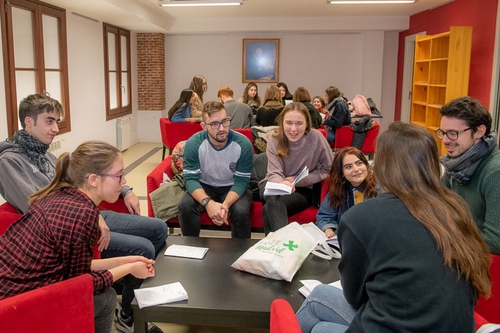Commented Bible Passages
June
As surely as God is faithful, our message to you is not "Yes" and "No." For the Son of God, Jesus Christ, who was preached among you by us—by me and Silas and Timothy—was not "Yes" and "No," but in him it has always been "Yes." For no matter how many promises God has made, they are "Yes" in Christ. And so through him the "Amen" is spoken by us to the glory of God. (2 Corinthians 1:18-20)
It is often said that what people desire most in life is to love and be loved. But what is love?
Although love can involve feelings, love is not a feeling. I know I am loved when someone sees who I am and affirms it. I am loved when another person discerns, beyond my qualities and my defects, the unique person that I am, and says yes to that person.
To be loved, then, is to hear a yes that I do not have to earn, a yes that is not taken back or conditioned by life’s changes. This kind of yes has always been hard for human beings to speak. In our day, it is almost impossible.
In the above text, Saint Paul tells us that God has spoken this yes to each one of us. At the root of our being lies God’s unconditional yes to who we are; it is this yes that makes us into living human beings.
God’s yes is shown first of all by the fact that we exist. In creating us, in calling us into being, God says to you and to me: I want you to exist; you are precious in my sight. And throughout the history told in the Bible, God shows his yes by continuing to offer his people the fullness of life, in spite of their constant unfaithfulness.
But will God get tired one day of our refusals? Will God’s yes ever reach its limit? No, says Saint Paul, because in sending his Son who gave his life out of love for us, God shows that his yes is a yes to the very end. If you give your life for someone, you have given everything, once and for all (see John 15:13).
It is this definitive, unconditional yes of God to us in Christ that enables us to express, by our life, a yes in return. That is why Saint Paul continues: Through Christ we can say “Amen”, in other words yes, to God for his glory. And we say this yes to God by saying yes to our fellow human beings, by affirming their existence by our words and our acts.
When we discover God’s yes in us, we leave behind our illusions and enter reality. We find a base from which to consent to what we are or are not, as the Letter from Kenya puts it. Further, we become women and men who are able to persevere in loving others. We can see beyond their limits and put our trust in the yes that God has spoken in them. We become able to realize that extreme form of love which is called forgiveness.
Living in our world today often feels like walking on quicksand. More than anything else, we need women and men who show us solid ground by witnessing to a yes that is not “yes and no”. If we root ourselves in God’s yes to us in Christ, we can become those people, and together we can turn our planet into a place where everyone feels at home.
![]() Are there people who have enabled me to live by their unconditional acceptance of me? Are there people whom I accept as they are and thus help to accept themselves?
Are there people who have enabled me to live by their unconditional acceptance of me? Are there people whom I accept as they are and thus help to accept themselves?
![]() What enables me to discover the unconditional yes that God has spoken to me?
What enables me to discover the unconditional yes that God has spoken to me?
![]() In what different ways can we speak God’s yes to others?
In what different ways can we speak God’s yes to others?
 TAIZÉ
TAIZÉ